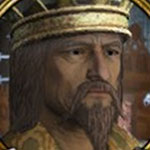
The 188th Pope, Nicholas III headed one of the most controversial and corrupt Papal rules from 1277 to 1280.
Haunted throughout his career by accusations of corruption and nepotism, the Holy See is best remembered in modern times as one of the subjects condemned to Hell in Dante’s “The Inferno”.
Before the Papacy
Born Giovanni Gaetano Orsini, the future Pope was part of a noble family that ruled over a large portion of modern-day Italy. The future Pope was born in Roma where his father was handed the role of Senator of the Holy City where he had played a key role in protecting the city from the grasp of Frederick II. Unlike most Popes, Nicholas III did not take Holy Orders until he was appointed Pope.
The Influence of St. Francis of Assissi
One of the major areas of influence for the future Pope was his father’s friendship with the renowned St. Francis of Assissi. It is thought the close relationship between his father and the Saint led to the generous gifts and success afforded the Franciscans during his papacy.
A Difficult Time and Election
Pope Nicholas III had become a trusted ally of every new Church leader throughout his adult life but had not been ordained a priest despite taking the role of General Inquisitor in 1262. In 1276, four Popes headed the Church culminating in the election of Pope John XXI.
The Pope would die when a new roof collapsed on him leading to a six-month conclave where the most experienced Cardinal failed to lead the 12 members to a decision. Eventually, Pope Nicholas III was elected with some controversy because of his not being a candidate chosen by the King of France.
Accusations of Corruption and Nepotism
One of the reasons for the continued fame of Pope Nicholas III is his inclusion in the poem, “The Inferno” by Dante. The inclusion of the Pope in the eighth circle of Hell is because of the nepotism he showed to his family after taking up the role of the Holy See. As the Vicar of Rome, Nicholas awarded many of his close relatives roles as cardinals and gave his family lands owned by the Church.
Quick Facts about Pope Nicholas III
- He was born in Rome in 1225 making him 52 when he became Pope.
- Nicholas III was born Giovanni and was a member of the noble, Orsini family and had given the world a number of Popes.
- Pope Nicholas III died on 22 August 1280 at his country retreat in Castro Soriano.
- Little is known about the reasons behind his quick demise and death. Contemporary writers state the Pope was struck down suddenly and died without ever regaining the ability to speak.
- Pope Nicholas III reigned as Pope for two years, eight months, and 28 days.
- Nicholas III was replaced by Pope Martin IV.
Interesting Facts About Pope Nicholas III
One of the main concerns of the Pope after he was appointed to the position was to secure the borders of the Papal states through a series of treaties with different rulers. The ongoing concerns over the power of Frederick II were finally put to bed under the leadership of Nicholas III.
During his lifetime and during the many studies that have looked back on his life, Pope Nicholas III is seen as a contradiction. He is often referred to as a thoughtful and intelligent Pope, but he would reward his family members with lands, wealth, and positions of power.
The poet Dante included Pope Nicholas III in his poem, “The Inferno” and states he was condemned to Hell for the crime of selling Church offices and position.
Like most Popes of the period who died suddenly, conspiracy theories have been seen since his unexpected death. The fact Nicholas III was suddenly taken ill and died while unable to speak or move freely has given rise to theories he was poisoned by his many enemies.